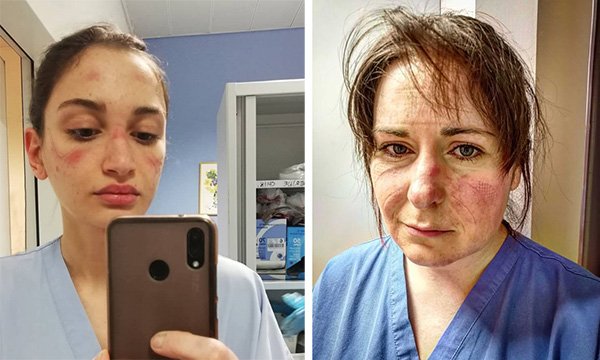
Pic: Alessia Bonari and Aimee Goold
Dermatologists in occupational skin disease clinics are seeing large numbers of health professionals with irritant contact dermatitis caused by prolonged use of PPE and frequent handwashing.
In a report presented at the British Association of Dermatologists Virtual Annual Meeting, 59% of healthcare workers seen in clinics set up during the COVOD-19 pandemic were found to be affected by irritant contact dermatitis.
Frequent hand cleansing is also a likely causative factor in the spike of skin irritation, with frontline healthcare workers reporting washing their hands with soap an average of 22.8 times per day and using alcohol hand gel 22.7 times per day.
The findings comes from members of the British Society of Cutaneous Allergy who conducted an audit of 200 hospital-based healthcare workers attending clinics for those with occupational skin disease in the UK and Ireland.
They found that prolonged contact with PPE was frequently associated with irritant contact dermatitis in healthcare workers, with 18% requiring time off work as a result of occupational skin problems, “representing a significant burden on the health service during an extremely difficult time.”
The duration for which PPE was worn, frequency of handwashing and use of alcohol hand gel were found to have an impact on the time off work required.
Longer duration of PPE wear during a shift, and more frequent handwashing tended to increase the amount of time off, whereas using alcohol gel did not.
Almost all the skin problems affected the face and hands. The second most common diagnosis seen in the audit was acne, caused by the occlusive effects of prolonged mask wear and seen in 15 per cent of healthcare workers. Pressure injuries related to mask wear were seen in five per cent of subjects.
“As PPE and handwashing are essential methods of reducing the spread of COVID-19, it is important to provide healthcare workers with advice and support in managing their skin,” said Dr Isha Narang, lead researcher of the study and registrar at University Hospitals of Derby and Burton NHS Foundation.
For the face, the study authors advise protecting the skin with medical-grade silicon tape before donning tight-fitting masks, then rechecking the fit of the mask.
They also recommend regular breaks be taken during shifts during which the PPE, such as masks, goggles and gloves, is removed to reduce the amount of contact time with the skin.
And facial skin be regularly moisturised when not at work.
“We would also recommend that people dry their hands fully after washing by patting them dry, not rubbing them. Moisturisers (emollients) are an essential part of treating dermatitis and should be applied generously after handwashing and whenever the skin feels dry,” they said.
“In severe cases, or if an infection is suspected, further treatment from a GP or an Occupational Health doctor may be required”